October 20, 2024
Libraries Are Important. It’s a Fact.
You might have seen some of our library statistics showing up across Regina over the summer. The campaign included information about the number of people who benefit from library services and some of the larger economic impacts of libraries. Libraries contribute so many amazing things to the community, and we wanted to share some of those facts with you.
Learn more about where these statistics come from below.
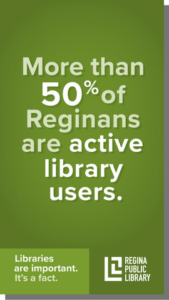
More than 50% of Reginans are active library users.
We define active library users as people who have used the library – either in person or online – within the last three years.
In fact, we believe this number is even larger because there are lots of cards used by more than one person in a family.
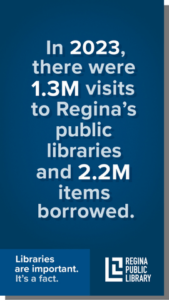
In 2023, there were 1.3M visits to Regina’s public libraries and 2.2M items borrowed.
In addition, there were:
- 14,370 new library cards issued;
- 1.6 million books and materials borrowed;
- 560,000 eBooks, eAudiobooks, and streaming movies, TV and music borrowed; and
- 5,396 library programs with 111,593 participants.
Looking for more information about how we report back to the community? Visit our annual reporting page and read our latest Annual Report.
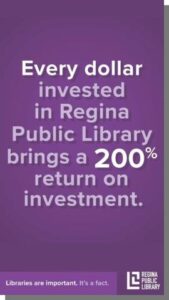
Every dollar invested in Regina Public Library brings a 200% return on investment.
According to third-party calculations, if you add up all the services we provide to the city, the economic benefit is estimated to be $70 million. As a result, RPL generates $2.98 in economic value for each dollar invested in it – the equivalent of $309 of value for each Regina resident.
This return on investment is similar to other Canadian library systems. It demonstrates that shared investment in library programs, activities, and services creates significant collective benefit for the dollars spent.
What’s more, the average value of one open hour at a library branch equates to $1,410.
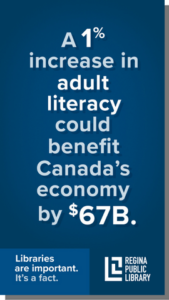
A 1% increase in adult literacy could benefit Canada’s economy by $67B.
That’s the equivalent of approximately $1,800 more in the pockets of each Canadian every year. You can learn more about the value of libraries in Canada from Overdue: The Case for Canada’s Public Libraries authored by the Canadian Urban Institute.
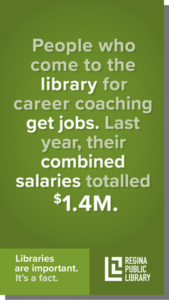
People who come to the library for career coaching get jobs. Last year, their combined salaries totalled $1.4M.
In 2023, RPL leveraged the expertise of 11 highly skilled volunteers to offer one-on-one career coaching sessions. Of the 27 individuals who secured jobs after participating, 26 got full-time professional positions with an estimated average annual salary of $54,511.71 per person. The combined amount of all 26 salaries was $1,432,304.53.
RPL’s career coaching program has created substantial positive impacts on job seekers, empowering individuals to decrease their reliance on social support and improve their overall quality of life. Additionally, RPL organized a highly impactful non-profit career fair with the participation of 25 non-profit organizations and an attendance of over 250 people.
Explore career coaching, and other business supports.
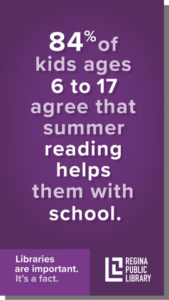
84% of kids ages 6 to 17 agree that summer reading helps them with school.
This was a key finding in the Kids and Family Reading Report Canadian Edition that the Scholastic company undertook in 2017 to explore the attitudes and behaviours of Canadian children and families around reading books for fun. Other key findings:
- Children, particularly those who are frequent readers, gain inspiration (76%) and a sense of accomplishment (90%) from reading.
- Parents’ reading habits play a large role in determining how often kids read: 57% of kids who are frequent readers have parents who read books 5–7 days per week, compared to only 15% of kids who are infrequent readers.
- Ninety-four percent of children agree that their favourite books are the ones they picked out themselves, and almost all children (92%) agree that they are more likely to finish a book they picked out.
- Ninety-seven percent of parents agree that every school should have a library.
